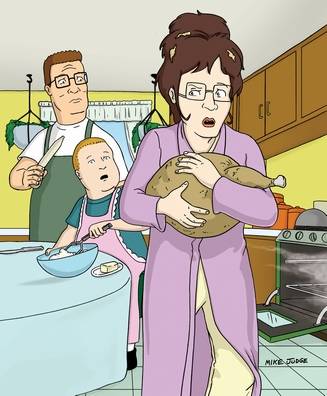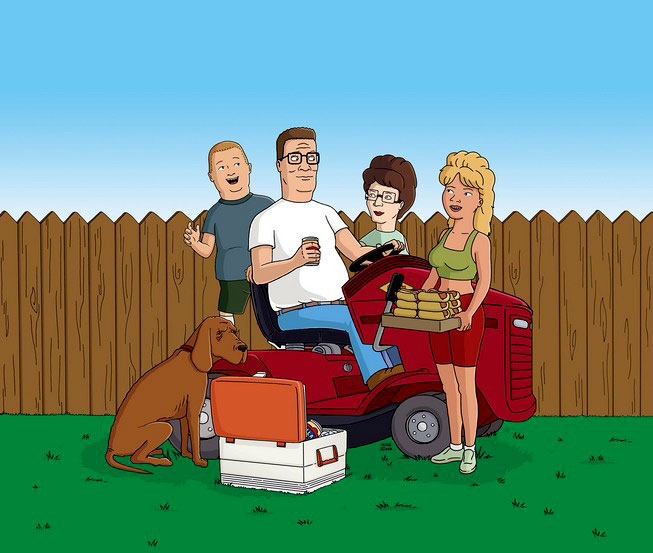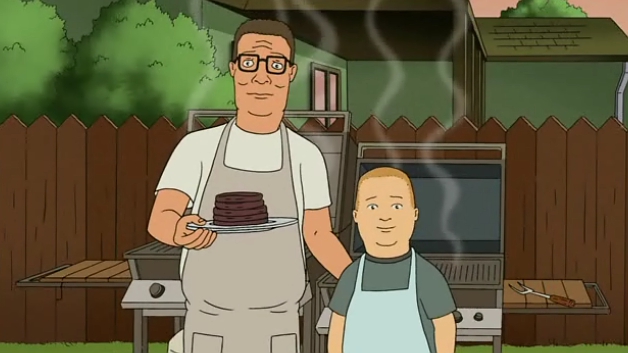I have a Netflix weakness. I have this strange ability to consume entire seasons and even full series within a few days (insomnia has its perks). My most recent obsession, King of the Hill, has resulted in my adoration for one character in particular, Bobby Hill. The show itself focuses on the Hill family of Arlen, Texas, led by the straightforward propane patriarch, Hank Hill. King of the Hill approaches common situations encountered by the average individual and handles them in a comedic manner. Mike Judge, one of the show’s creators, based some of his characters around people he had known while living in Texas.
Residing with Hank in the Hill household are Hank’s wife, Peggy, their teenage son Bobby, and occasionally Bobby’s maternal cousin Luanne Platter. Bobby, much to his father’s displeasure, aspires to be a famous prop comic and is often the victim of bullying due to his passive nature. Many episodes in King of the Hill are centered on Hank and Bobby’s somewhat strained relationship, filled with misunderstanding. Hank’s perception of masculinity often interferes with any attempts to understand Bobby, often resulting in Hank’s famous line, “the boy ain’t right.”
Bobby has a wonderful ability to shamelessly and subconsciously resist the gendered expectations set before him by his father. Bobby isn’t the stunning athlete or talented craftsman that his father is, which often results in Hank doubting Bobby’s masculinity and heterosexuality. Part of the tension that exists between the father and son early in the show is because of Hank’s assumption that Bobby is queer. This suspicion is set aside when Bobby begins to develop romantic feelings for their neighbor Kahn (Connie) Souphanousinphone Jr. Bobby himself appears to be aware of his less than masculine attributes, as hinted during an exchange with Connie in the episode “Westie Side Story.”
Bobby: “Why are you named Kahn Jr.?”
Kahn Jr.: “My father wanted a boy.”
Bobby: “Yeah, so did mine.”
 In “Goodbye Normal Jeans”, Bobby continues to demonstrate his personal gender subversion by actively participating in his home economics class after an unfortunate bleaching accident destroys his father’s dungarees. Bobby also takes up the household tasks – he excels at them, in fact – basically taking Peggy’s place in the Hill household. Hank begins to prefer Bobby’s cooking and cleaning skills to Peggy’s. Peggy feels threatened by Bobby’s new position in the home, but Hank takes up the reigns of femininity and cooks Peggy a Thanksgiving dinner, an action that is considered sweet and loving on his part. (Hank prepares a meal of Peggy’s “famous” dishes, as opposed to the food Bobby has been cooking in its place.) This particularly episode shows the fluidity of masculinity/femininity even outside the Hill household. Near the end of the episode, Peggy flees her home to seek refuge with her hairdresser, who she assumed is gay. Much to her surprise (and possibly the viewer’s), the hairdresser is revealed to be straight via his wife and infant son.
In “Goodbye Normal Jeans”, Bobby continues to demonstrate his personal gender subversion by actively participating in his home economics class after an unfortunate bleaching accident destroys his father’s dungarees. Bobby also takes up the household tasks – he excels at them, in fact – basically taking Peggy’s place in the Hill household. Hank begins to prefer Bobby’s cooking and cleaning skills to Peggy’s. Peggy feels threatened by Bobby’s new position in the home, but Hank takes up the reigns of femininity and cooks Peggy a Thanksgiving dinner, an action that is considered sweet and loving on his part. (Hank prepares a meal of Peggy’s “famous” dishes, as opposed to the food Bobby has been cooking in its place.) This particularly episode shows the fluidity of masculinity/femininity even outside the Hill household. Near the end of the episode, Peggy flees her home to seek refuge with her hairdresser, who she assumed is gay. Much to her surprise (and possibly the viewer’s), the hairdresser is revealed to be straight via his wife and infant son.
Bobby’s cousin, Luanne Platter, lies in stark contrast to Bobby’s failing masculinity. Luanne participates in (highly stereotyped) feminine tasks and behaviors, attending beauty school and letting her life revolve around her boyfriend, for instance. Despite being portrayed as a bit of an airhead, Luanne proves herself to be incredibly competent in car repairs and logic based puzzles. Ultimately, Luanne’s interest in masculine tasks isn’t a threat to Hank. She reinforces her status as a woman by dating several men throughout the series, becoming pregnant, and then later marrying her child’s father, Lucky. Yet Luanne is not without her crises. In “Luanne Virgin 2.0”, the Hill household is thrown into a moral panic when it is revealed that both Luanne and Peggy have had premarital sex. In order to make up for this decidedly female “crime”, Luanne becomes a “born again” virgin and soon finds herself in another crisis: rushing into a marriage with a man just so the two can have sex without becoming sinners. These examples present an important contrast between Bobby and Luanne, as Bobby’s failures of masculinity are never treated the same way as Luanne’s failures of femininity.
Still, Bobby does occasionally display masculine behavior. He is an impressive marksman and manages to outshine his father in his rifle shooting abilities. He is also able to display masculine power in a moment of rage, punching his friend Joseph Gribble after discovering him kissing Connie. But does Bobby’s limited displays of masculinity make up for his gender subversion? In the series finale, “To Sirloin with Love”, Bobby seems to prove himself as a man in Hank’s eyes. After displaying a talent for distinguishing cuts of beef, Bobby joins the Heimlich County community college’s meat inspection team to the absolute joy of Hank and Peggy. While this episode does not exude Bobby’s wavering masculinity, the episode (and the series) ends with Bobby and Hank jointly participating in the manliest of domestic tasks: grilling hunks of meat for their friends and family on their own father and son propane barbecues.




Krista, great first post! Glad to finally have it on the site :)
I’ve only watched King of the Hill in bits and pieces, but when I was reading your article, I looked up some clips. It’s kind of interesting because from what I can tell, Hank does sometimes have a very “Hey, woah, what?” reaction to his son, but it also seems like he really wants to try and understand and encourage him. There was a clip about him coming into Bobby’s room and telling him he’s going to support him in his interest in planting roses, and in another clip, Hank watches Bobby practice a dance routine for auditioning as the school’s mascot and offers to make him props. All of Hank’s involvement is kind of done still with a degree of macho “I’m only OK with this because it just barely walks the line with some masculine things” but it seems like even Hank, in his effort to figure out his son, is subverting the expectations. But obviously, I know it’s a lot more nuanced. I’ll just have to join you in watching the show ;)
Great post! I intend on spending the rest of the evening yelling “THAT’S MY PURSE.”